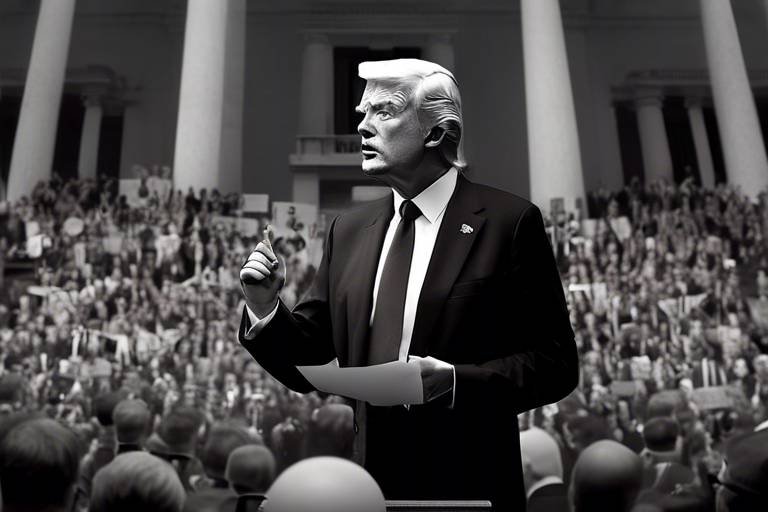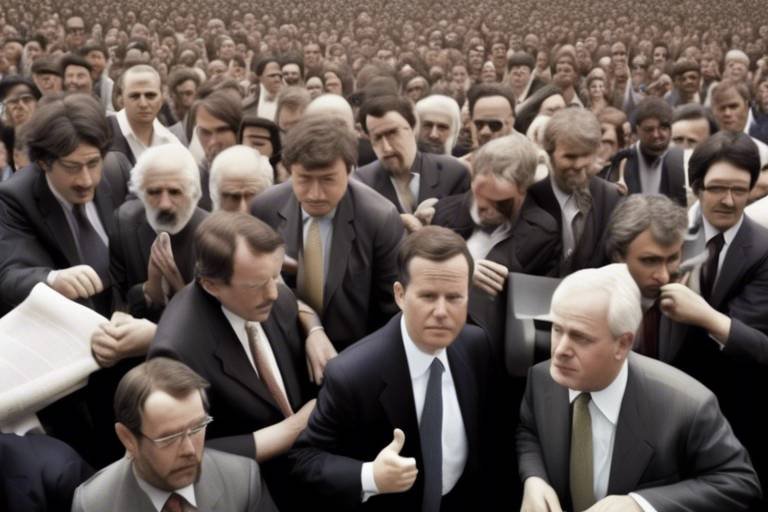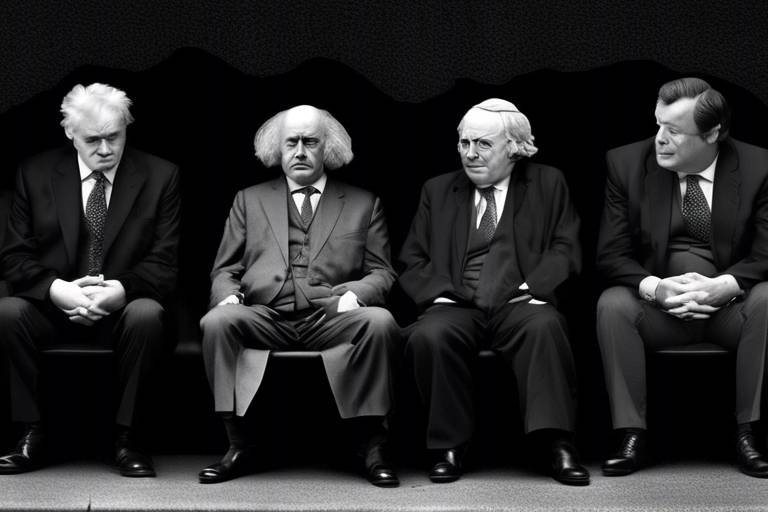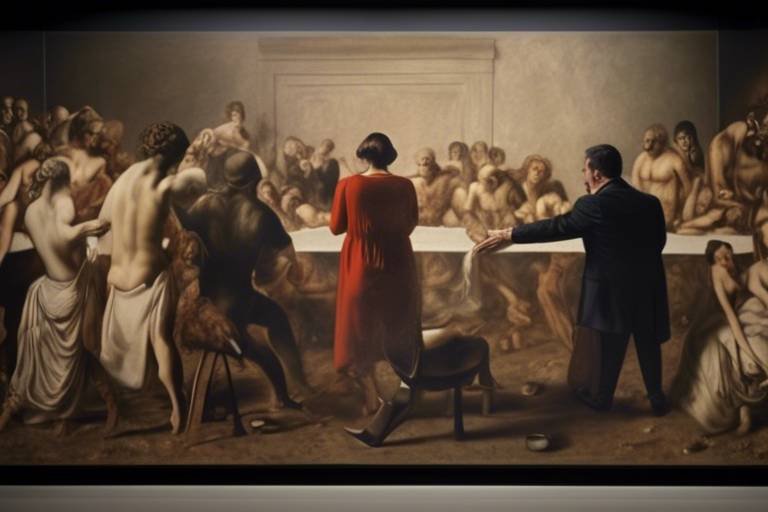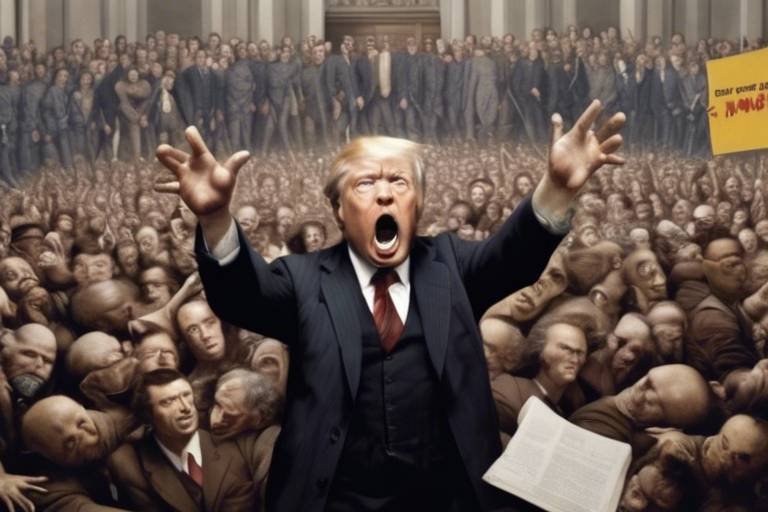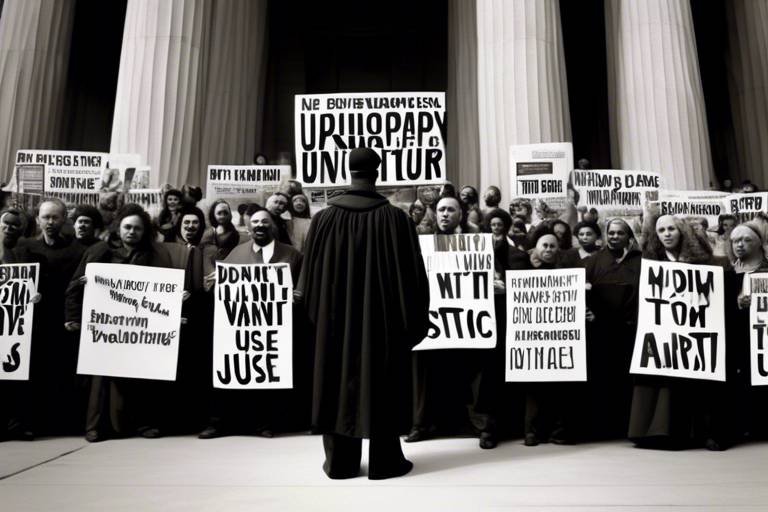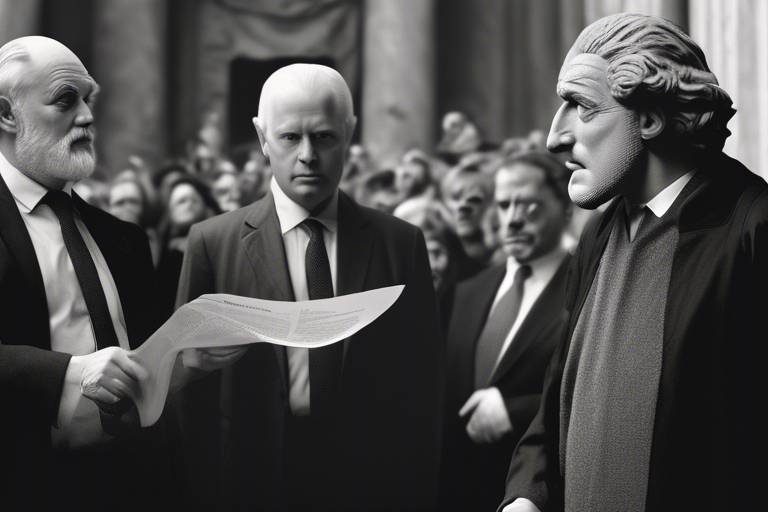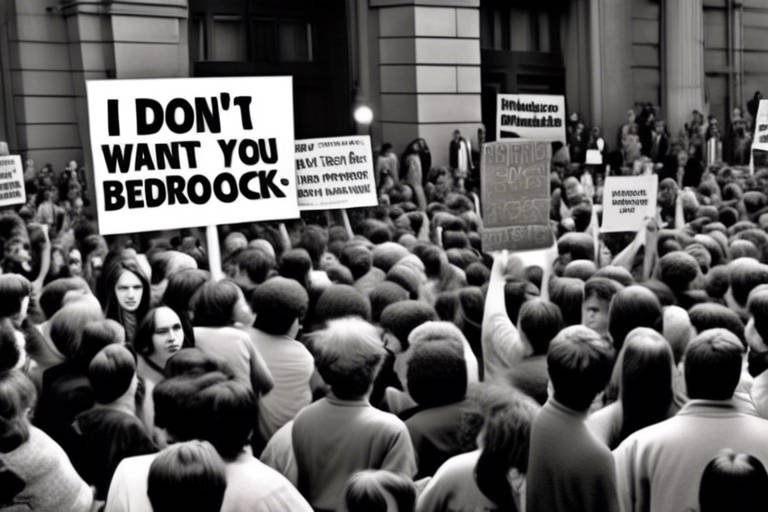The Connection Between Politics and Philosophy - A Deeper Look
Politics and philosophy are intertwined in a complex dance that shapes the very fabric of society. When we think about politics, we often envision debates, elections, and policies that govern our daily lives. However, behind the scenes, there lies a rich tapestry of philosophical thought that influences these political actions. Philosophy provides the foundational principles that guide political ideologies, making it essential for anyone seeking to understand the motivations behind political systems and decisions.
At its core, philosophy asks profound questions about human existence, morality, and the nature of justice. These inquiries are not just academic; they are deeply practical. For instance, when politicians argue for certain policies, they often draw upon philosophical ideas to justify their positions. Think about it: when a leader advocates for social welfare, they might be influenced by the principles of utilitarianism or social contract theory. This connection between abstract thought and real-world governance is what makes the study of political philosophy so fascinating.
Throughout history, we can see how philosophical ideas have shaped political landscapes. From the democratic ideals of ancient Greece, articulated by thinkers like Plato and Aristotle, to the revolutionary concepts of liberty and equality championed by Enlightenment philosophers, the evolution of political thought is a direct reflection of philosophical discourse. These ancient ideas continue to resonate today, influencing not only political theory but also the practical workings of governments around the world.
In contemporary discussions, the relevance of philosophical thought in politics cannot be overstated. As we grapple with pressing issues such as climate change, social justice, and economic inequality, philosophical frameworks offer valuable insights. They help us navigate the murky waters of political discourse, allowing us to evaluate the ethical implications of our choices. For instance, when debating environmental policies, we must consider not only the immediate benefits but also the long-term consequences for future generations—a concept deeply rooted in philosophical ethics.
In summary, the connection between politics and philosophy is not just theoretical; it is a vital part of how we understand and engage with the world around us. By exploring this relationship, we can gain a deeper appreciation for the complexities of governance and the moral obligations that come with it. As we move forward, it is crucial to keep this connection in mind, as it will undoubtedly shape the political landscape of tomorrow.
- How does philosophy influence political decision-making?
Philosophy provides the ethical frameworks and principles that guide political leaders in making decisions that affect society. It helps them evaluate the implications of their actions and policies.
- What are some key philosophical theories in politics?
Some major theories include liberalism, conservatism, socialism, and utilitarianism. Each of these theories offers different perspectives on governance, rights, and the role of the state.
- Why is ethics important in politics?
Ethics is crucial because it helps ensure that political leaders act in the best interests of their constituents, fostering trust and accountability within the political system.

The Historical Roots of Political Philosophy
When we dive into the historical roots of political philosophy, we embark on a journey that takes us back to ancient civilizations, where the seeds of modern political thought were first sown. Think about it: the ideas that shape our governance today were once just theories scribbled on papyrus by thinkers like Plato and Aristotle. These philosophers didn’t just philosophize; they laid down the very foundations of how societies could be structured, governed, and understood.
Plato, with his visionary ideas, introduced the concept of the "ideal state" in works like "The Republic." He envisioned a society governed by philosopher-kings, individuals who possessed both wisdom and virtue. This notion of enlightened leadership sparked discussions that resonate even today. Can you imagine a world where leaders are chosen for their wisdom rather than their popularity? Plato’s ideas challenge us to think about the qualities we value in our leaders.
On the other hand, Aristotle took a more pragmatic approach. He analyzed various political systems and classified them into categories, such as monarchies, aristocracies, and democracies. His work, "Politics," is a profound examination of how different forms of governance can lead to different outcomes for citizens. Aristotle’s belief that humans are social animals highlights the importance of community and the role of citizens in shaping their government. This idea is crucial, especially in discussions about civic engagement and participation in modern democracies.
As we move through history, we see how these ancient philosophies influenced later thinkers during the Renaissance and Enlightenment periods. Philosophers like John Locke and Jean-Jacques Rousseau expanded upon the ideas of their predecessors, introducing concepts of natural rights and the social contract. Locke’s assertion that individuals have inherent rights to life, liberty, and property became a cornerstone of liberal political thought, while Rousseau’s emphasis on the collective will of the people laid the groundwork for modern democratic principles.
To understand the impact of these philosophical roots on contemporary politics, we can look at how they inform current political ideologies. For instance, the debate over individual rights versus the common good can be traced back to these early discussions. It raises the question: how do we find a balance between personal freedoms and societal responsibilities? This tension is as relevant today as it was in the times of Plato and Aristotle.
In summary, the historical roots of political philosophy are not just relics of the past; they are living ideas that continue to shape our political landscape. By examining the thoughts of ancient philosophers, we gain insights into the fundamental questions of governance, power, and ethics that still challenge us today. So, the next time you ponder the complexities of politics, remember that the answers may lie in the wisdom of those who came before us.
- What is the significance of political philosophy? Political philosophy helps us understand the nature of power, governance, and the ethical implications of political decisions.
- How did ancient philosophers influence modern politics? Ancient philosophers like Plato and Aristotle laid the groundwork for modern political theories, shaping ideas about democracy, governance, and ethics.
- What are some key concepts in political philosophy? Key concepts include justice, rights, the state, and the role of individuals within society.
- Why is civic engagement important? Civic engagement fosters a sense of responsibility among citizens and ensures that government reflects the will of the people.

Key Philosophical Theories in Politics
When we dive into the world of politics, it’s impossible to ignore the profound impact of philosophical theories on our understanding of governance and societal structures. These theories serve as the backbone of political ideologies, shaping the way we perceive authority, freedom, and justice. At the heart of political philosophy, we find several key theories that have stood the test of time, influencing both historical and contemporary political landscapes.
One of the most prominent theories is liberalism, which champions individual rights and freedoms as paramount. Liberal thinkers advocate for a government that protects these rights, promoting democracy and free markets. In essence, liberalism is about creating a society where individuals can pursue their own happiness without excessive interference from the state. This theory has deeply influenced modern democracies, emphasizing the importance of civil liberties and equality before the law.
On the other side of the spectrum, we have conservatism, which values tradition and social stability. Conservatives argue that societal structures should be preserved to maintain order and continuity. They often express skepticism towards rapid change, fearing that it may undermine the fabric of society. This theory emphasizes the importance of family, religion, and community as cornerstones of a healthy political system. In many ways, conservatism acts as a counterbalance to the more progressive ideas of liberalism, reminding us of the value of historical context in shaping our political beliefs.
Then there's socialism, a theory that advocates for social ownership and democratic control of the means of production. Socialists argue that capitalism leads to inequality and exploitation, and they seek to create a system where wealth and resources are distributed more equitably. This theory has inspired various political movements around the world, pushing for policies that prioritize the welfare of the community over individual profit. Socialism challenges us to rethink our notions of success and progress, urging us to consider the collective good.
Within these broader categories, we also encounter nuanced theories such as utilitarianism and social contract theory, which further enrich our understanding of political thought. Utilitarianism, for instance, evaluates actions based on their outcomes, promoting the idea of the greatest good for the greatest number. This principle can guide policymakers in their decision-making processes, as they weigh the potential benefits and harms of their actions.
In contrast, social contract theory delves into the legitimacy of governmental authority. It posits that governments derive their power from the consent of the governed, emphasizing the moral obligations of citizens to participate in and uphold democratic principles. This theory invites us to reflect on our roles as active participants in the political process, reminding us that our voices matter in shaping the society we live in.
Ultimately, these philosophical theories are not just abstract concepts; they are the lens through which we view and engage with the political world. They challenge us to think critically about our values and the systems that govern our lives. Understanding these theories equips us to navigate the complexities of modern politics, fostering informed citizens who can contribute meaningfully to the democratic process.
- What is the main focus of liberalism? Liberalism primarily emphasizes individual rights and freedoms, advocating for a government that protects these rights.
- How does conservatism differ from liberalism? Conservatism values tradition and social stability, often resisting rapid change, while liberalism promotes individual freedoms and democratic governance.
- What is socialism's stance on wealth distribution? Socialism advocates for social ownership and equitable distribution of wealth and resources, challenging capitalist principles that may lead to inequality.
- What role does utilitarianism play in politics? Utilitarianism guides political decision-making by evaluating actions based on their outcomes, aiming for the greatest good for the greatest number.
- What is social contract theory? Social contract theory explores the legitimacy of governmental authority based on the consent of the governed and the moral obligations of citizens.

Utilitarianism and Political Decision-Making
Utilitarianism is a philosophical theory that has profoundly influenced political decision-making processes across the globe. At its core, this approach advocates for actions that maximize overall happiness and minimize suffering. Imagine a scale where every decision weighs the happiness of the many against the pain of the few; this is the essence of utilitarian thought. Politicians often grapple with the challenge of making choices that benefit the majority while navigating the complexities of individual rights and societal norms.
In practice, utilitarianism serves as a guiding principle for policymakers, pushing them to consider the broader consequences of their actions. For instance, when debating healthcare reforms, a utilitarian perspective would lead lawmakers to evaluate how proposed changes would impact the overall health and well-being of the population. Would a new policy improve access to care for the majority, even if it requires sacrifices from a minority? This kind of analysis is crucial in political discussions, where the stakes can be incredibly high.
Utilitarianism can be broken down into several key components that influence political decision-making:
- The Greatest Good: Decisions should aim to achieve the highest level of happiness for the largest number of people.
- Consequentialism: The morality of an action is determined by its outcomes, not by intentions.
- Cost-Benefit Analysis: Policymakers often conduct analyses to weigh the potential benefits of a decision against its costs, striving for a net positive effect.
However, while utilitarianism provides a structured framework for evaluating political choices, it is not without its pitfalls. Critics argue that this approach can sometimes justify morally questionable actions if they lead to a favorable outcome for the majority. For example, consider a scenario where a government might prioritize economic growth that benefits many but at the expense of a marginalized group. This raises ethical questions: Is it justifiable to harm a few for the happiness of the many? Such dilemmas highlight the tension between utilitarian ideals and the protection of individual rights.
Moreover, the influence of utilitarianism extends beyond theoretical discussions; it is actively applied in contemporary policy debates. Take environmental policy, for instance. Decisions regarding climate change often revolve around utilitarian principles, as leaders must consider the long-term benefits of sustainability against the immediate costs of implementing green technologies. The challenge lies in predicting outcomes accurately and ensuring that all voices, especially those of vulnerable communities, are heard in the decision-making process.
In summary, utilitarianism is a powerful lens through which political decision-making can be viewed. It compels leaders to consider the greater good while navigating the ethical complexities that arise from their choices. As we move forward in an increasingly interconnected world, the principles of utilitarianism will undoubtedly continue to shape the landscape of political discourse, urging us to reflect on what it truly means to act in the best interest of society as a whole.
- What is utilitarianism? Utilitarianism is a philosophical theory that suggests actions are right if they promote happiness and wrong if they produce the opposite of happiness.
- How does utilitarianism influence political decisions? It encourages policymakers to consider the consequences of their actions, aiming for the greatest benefit for the largest number of people.
- What are the criticisms of utilitarianism? Critics argue that it can justify harmful actions to a minority if it benefits the majority, raising ethical concerns about individual rights.

Critiques of Utilitarianism
Utilitarianism, while a powerful framework for political decision-making, is not without its critiques. One of the most significant concerns revolves around its potential to justify actions that may be harmful to minorities in the name of achieving the greatest good for the greatest number. Imagine a scenario where a government enacts a policy that benefits the majority but severely harms a small group of individuals. This raises a fundamental ethical question: is it morally acceptable to sacrifice the well-being of a few for the happiness of many? This dilemma highlights a critical flaw in utilitarian thinking, where the ends may seem to justify the means, but at what cost?
Moreover, critics argue that utilitarianism can lead to a lack of individual rights. Under a strict utilitarian approach, the rights of individuals can be overlooked if their suffering is outweighed by the happiness of the majority. For example, if a society decides to impose harsh penalties on a minority group to deter crime across the population, this could be seen as an acceptable utilitarian outcome, even though it violates fundamental human rights. Such actions can create a slippery slope, where the protection of individual rights becomes secondary to collective welfare.
Another critique focuses on the challenge of measuring happiness and suffering. How do we quantify happiness? Is it possible to accurately assess the consequences of a policy on all individuals involved? The subjective nature of happiness complicates the utilitarian calculus, making it difficult to determine the best course of action. Critics argue that this ambiguity can lead to arbitrary or biased decisions, as policymakers may prioritize certain interests over others based on their personal beliefs or societal pressures.
In addition, utilitarianism can sometimes promote short-term thinking. Policymakers, driven by the desire to achieve immediate benefits for the majority, may overlook long-term consequences that could ultimately harm society. For instance, a government might prioritize economic growth through environmentally damaging practices because they provide short-term gains. However, the long-term effects—such as climate change or resource depletion—could result in far greater suffering for future generations. This raises another important question: should we prioritize immediate happiness over the sustainability of our planet and the well-being of future inhabitants?
In summary, while utilitarianism offers a compelling framework for evaluating political decisions, it is essential to consider these critiques. The potential for justifying harmful actions, neglecting individual rights, the challenge of measuring happiness, and the risk of short-term thinking all highlight the complexities of applying utilitarian principles in governance. As we navigate the intricate landscape of political philosophy, it becomes clear that a balanced approach—one that considers both the collective good and individual rights—is crucial for ethical decision-making.
- What is utilitarianism? Utilitarianism is a philosophical theory that suggests the best action is the one that maximizes overall happiness or well-being for the greatest number of people.
- What are the main critiques of utilitarianism? Some critiques include its potential to justify harmful actions for the majority, neglect of individual rights, difficulties in measuring happiness, and short-term focus.
- How does utilitarianism affect political decision-making? Utilitarianism influences policymakers to consider the consequences of their actions on the overall happiness of society, often leading to decisions that prioritize collective welfare.
- Can utilitarianism coexist with individual rights? While utilitarianism can sometimes conflict with individual rights, many argue for a balanced approach that incorporates both collective good and respect for individual liberties.

Modern Applications of Utilitarianism
In today's rapidly changing world, the principles of utilitarianism have found their way into various aspects of public policy and governance, influencing decisions that affect millions. The core idea behind utilitarianism is simple yet profound: actions are judged based on their consequences, specifically in terms of the overall happiness or well-being they produce. This approach has significant implications in areas such as healthcare, environmental policy, and economic reforms.
Take, for instance, the realm of healthcare. Policymakers often face the daunting task of allocating limited resources to maximize health outcomes. By applying utilitarian principles, they can prioritize treatments and interventions that yield the greatest benefit to the largest number of people. This means that public health initiatives, such as vaccination programs, are designed to achieve herd immunity, ultimately protecting the broader community and reducing the incidence of disease. The ethical challenge, however, lies in determining which interventions are most effective and how to balance individual rights with collective welfare.
Similarly, in the context of environmental policy, utilitarianism plays a crucial role. As global challenges like climate change threaten the planet, governments are tasked with making decisions that not only protect the environment but also consider the economic impacts on society. For example, implementing a carbon tax can be viewed through a utilitarian lens: while it may impose short-term costs on certain industries, the long-term benefits of reduced emissions and a healthier planet can lead to greater overall societal well-being. Here, the challenge is to communicate the benefits of such policies to the public, ensuring that the greater good is understood and supported.
To illustrate the impact of utilitarianism in modern decision-making, consider the following table that outlines various sectors and their applications:
| Sector | Utilitarian Application | Challenges |
|---|---|---|
| Healthcare | Resource allocation for maximum health benefits | Balancing individual rights vs. collective good |
| Environmental Policy | Implementing policies for sustainability | Economic impact on industries |
| Economic Reforms | Taxation policies to improve public welfare | Equity vs. efficiency in resource distribution |
As we navigate these complex issues, it's essential to recognize that while utilitarianism provides a useful framework for evaluating policies, it is not without its criticisms. Critics argue that relying solely on this approach can lead to the neglect of minority rights and the justification of harmful actions if they lead to greater overall happiness. Therefore, the challenge for modern policymakers is to integrate utilitarian principles with other ethical considerations, ensuring that the pursuit of the greatest good does not come at the expense of justice and equity.
- What is utilitarianism? Utilitarianism is a moral philosophy that suggests actions are right if they promote happiness or pleasure, and wrong if they produce unhappiness or pain.
- How is utilitarianism applied in healthcare? In healthcare, utilitarianism helps policymakers allocate resources to maximize health benefits for the greatest number of people.
- What are some criticisms of utilitarianism? Critics argue that utilitarianism can justify harmful actions against minorities if such actions benefit the majority, leading to ethical dilemmas.

Social Contract Theory
Social contract theory is a fascinating concept that explores the legitimacy of governmental authority based on the consent of the governed. Imagine a time when people lived without structured societies or governments; it was a chaotic existence, right? Philosophers like Thomas Hobbes, John Locke, and Jean-Jacques Rousseau sought to address this chaos by proposing that individuals collectively agree to form a society and establish a government to ensure peace and security. This agreement, though often implicit, is what we refer to as the social contract.
At its core, the social contract is about mutual benefit. Citizens agree to relinquish some personal freedoms in exchange for protection and order provided by the state. Think of it as a trade-off: you give up a bit of your freedom to ensure that everyone, including you, can live in a safe and structured environment. This idea has profound implications for the way we understand democracy, governance, and our responsibilities as citizens.
Different philosophers have interpreted the social contract in various ways. For instance, Hobbes believed that in a state of nature, life would be "solitary, poor, nasty, brutish, and short" without a strong central authority. Therefore, he argued that individuals must surrender their rights to a sovereign who can maintain peace. In contrast, Locke viewed the social contract as a means to protect natural rights—life, liberty, and property. He emphasized that if a government fails to protect these rights, citizens have the right to revolt. Rousseau, on the other hand, introduced the idea of the "general will," suggesting that true freedom is achieved when individuals collectively agree on the common good.
The relevance of social contract theory in modern politics cannot be overstated. It serves as a foundation for democratic principles, emphasizing the importance of consent and participation. In today's world, where issues like government surveillance, taxation, and civil rights are hotly debated, the principles of social contract theory challenge us to consider whether our governments are acting in our best interests. Are we, as citizens, truly consenting to the actions of our leaders? Or are we merely subjects of an authority that has lost sight of its foundational purpose?
To illustrate the key differences in the interpretations of social contract theory, consider the following table:
| Philosopher | View on Social Contract | Key Ideas |
|---|---|---|
| Thomas Hobbes | Absolute Sovereignty | Life in a state of nature is chaotic; strong authority needed for order. |
| John Locke | Government as Protector | Government should protect natural rights; citizens can revolt if it fails. |
| Jean-Jacques Rousseau | General Will | True freedom comes from collective agreement on the common good. |
In conclusion, social contract theory not only provides a framework for understanding the origins of political authority but also highlights the ongoing dialogue between citizens and their governments. It raises essential questions about our responsibilities as members of society and the ethical obligations of our leaders. As we navigate the complexities of modern governance, revisiting the principles of the social contract can empower us to advocate for a political landscape that truly reflects the will and needs of the people.
- What is the social contract theory?
The social contract theory is a philosophical concept that posits that individuals consent to form a society and establish a government to ensure mutual protection and order.
- Who are the main philosophers associated with social contract theory?
Key philosophers include Thomas Hobbes, John Locke, and Jean-Jacques Rousseau, each offering different interpretations of the social contract.
- How does social contract theory relate to modern democracy?
Social contract theory emphasizes the importance of consent and participation, serving as a foundation for democratic principles and citizens' rights.

The Role of Ethics in Politics
In the intricate web of political life, ethics plays a pivotal role that cannot be ignored. It's the moral compass guiding leaders and citizens alike, ensuring that decisions reflect the values of society. Imagine a ship navigating through treacherous waters; without a reliable compass, it risks veering off course. Similarly, in politics, ethical considerations help maintain the course of governance, steering it towards the common good. But what does it mean for ethics to be intertwined with politics?
At its core, ethics in politics involves the principles and values that govern the behavior of politicians and public servants. These ethical standards are crucial for fostering trust between leaders and the people they serve. When politicians act with integrity, they build a foundation of accountability and transparency, which is essential for a healthy democracy. Trust is like a fragile glass; once shattered, it can be incredibly difficult to mend. Ethical governance ensures that leaders are held accountable for their actions, thereby reinforcing the public's faith in the political system.
However, the path of ethical governance is not always straightforward. Leaders often face ethical dilemmas, situations where they must balance competing interests and make tough choices that may not please everyone. For instance, consider a politician who must decide between endorsing a policy that benefits a large segment of the population but harms a minority group. This scenario highlights the complexity of ethical decision-making in politics, where the right choice is often clouded by conflicting values and interests.
To navigate these dilemmas, politicians can rely on various ethical frameworks. One popular approach is the principle of utilitarianism, which suggests that actions should be judged based on their outcomes—specifically, whether they promote the greatest good for the greatest number. While this principle can provide guidance, it also raises questions about the rights of minorities and the potential for justifying harmful actions for the sake of the majority.
Additionally, ethics in politics isn't just about the actions of leaders; it also involves the responsibilities of citizens. Engaged and informed citizens play a crucial role in holding their leaders accountable. They must be vigilant, questioning decisions and demanding transparency. This active participation is essential in a democracy, as it ensures that the voices of the people are heard and considered in the political arena.
In essence, the role of ethics in politics is multifaceted. It shapes the behavior of leaders, influences public trust, and guides citizens in their interactions with the political system. As we move forward in an increasingly complex world, the importance of ethical considerations in politics will only grow. It is vital for both leaders and citizens to embrace these principles, fostering a political landscape that prioritizes the common good and upholds the values of justice and integrity.
- Why is ethics important in politics? Ethics is crucial in politics because it guides decision-making, fosters trust, and ensures accountability among leaders.
- What are some common ethical dilemmas faced by politicians? Politicians often face dilemmas such as balancing the needs of different groups, making decisions that may harm a minority for the benefit of the majority, and navigating conflicts of interest.
- How can citizens promote ethical governance? Citizens can promote ethical governance by staying informed, engaging in political discussions, and holding their leaders accountable through voting and advocacy.

Political Integrity and Accountability
In the ever-evolving landscape of politics, integrity and accountability stand as the twin pillars that uphold the trust between leaders and the public. Imagine a ship sailing through turbulent waters; without a sturdy hull, it risks capsizing. Similarly, political integrity is fundamental in ensuring that governance remains stable and trustworthy. When politicians act with integrity, they not only foster a culture of honesty but also cultivate an environment where citizens feel valued and heard. This is not just about following the rules; it's about embodying values that resonate with the electorate.
Accountability, on the other hand, is the mechanism through which integrity is enforced. It is the promise that leaders will answer for their actions, ensuring that they are held to the same standards as the citizens they serve. Think of accountability as the safety net that catches a performer who might stumble during a high-wire act. Without it, the risks of political misconduct grow exponentially. Citizens deserve to know that their leaders are not just making decisions in a vacuum but are instead responsible for the outcomes of those decisions. This relationship between leaders and the public is vital for maintaining a healthy democracy.
To illustrate the importance of political integrity and accountability, consider the following examples:
| Scenario | Impact of Integrity | Impact of Accountability |
|---|---|---|
| Corruption Scandal | Loss of public trust, decreased voter turnout | Legal consequences, potential for reform |
| Transparent Policy Decisions | Enhanced public confidence, increased civic engagement | Leaders are answerable to constituents, fostering dialogue |
In a world where misinformation can spread like wildfire, the role of integrity becomes even more crucial. Politicians must not only communicate transparently but also back their claims with verifiable facts. This transparency builds a foundation of trust that can withstand the test of time. When citizens feel that their leaders are acting in their best interests, they are more likely to engage in the political process, vote, and hold their representatives accountable.
However, the path to political integrity and accountability is fraught with challenges. Ethical dilemmas often arise, forcing leaders to navigate complex situations where personal interests may conflict with public good. For instance, a politician may face pressure from lobbyists to support legislation that benefits a specific group while potentially harming the broader community. Here, the integrity of the leader is tested, and the decision made can either strengthen or erode public trust.
Ultimately, the relationship between political integrity and accountability is symbiotic. Integrity without accountability can lead to complacency, while accountability without integrity may result in a mere facade of responsibility. Therefore, it is essential for leaders to cultivate both qualities to ensure that they serve their constituents effectively. By doing so, they not only enhance their own credibility but also contribute to the overall health of the political system.
In conclusion, the essence of political integrity and accountability lies in the commitment to serve with honesty and transparency. It is a continuous journey that requires dedication, self-reflection, and a willingness to confront difficult truths. As citizens, we must also play our part by demanding accountability and supporting leaders who prioritize integrity. Together, we can foster a political environment that reflects our shared values and aspirations.
- What is political integrity? Political integrity refers to the adherence to ethical principles and values by politicians, ensuring honesty and transparency in their actions.
- Why is accountability important in politics? Accountability ensures that leaders are answerable for their actions, fostering trust and encouraging responsible governance.
- How can citizens promote political integrity? Citizens can promote political integrity by staying informed, voting, and holding their leaders accountable through civic engagement.

Ethical Dilemmas in Governance
Governance is not just about making decisions; it's about making the *right* decisions. Ethical dilemmas in governance arise when leaders face conflicting values and interests, often leaving them caught between a rock and a hard place. Imagine being a captain of a ship navigating through stormy waters—every choice you make can either lead your crew to safety or into peril. Similarly, political leaders must weigh their options carefully, considering both the immediate and long-term consequences of their actions.
One of the most common ethical dilemmas involves balancing the needs of the majority against the rights of the minority. For instance, a government may propose a policy that benefits a large segment of the population but could infringe on the rights of a smaller group. This raises the question: *Is it acceptable to sacrifice a few for the greater good?* Such scenarios force leaders to confront their own moral compass and the ethical implications of their decisions.
Moreover, the pressure to meet public expectations can lead to ethical lapses. Politicians often promise more than they can deliver, driven by the desire to win votes or appease powerful interest groups. This creates a slippery slope where the ends justify the means. For example, a leader might resort to *manipulation or deception* to achieve a desired outcome, which can erode public trust and undermine the very fabric of democracy. The challenge lies in maintaining integrity while navigating the treacherous waters of political life.
To illustrate these dilemmas further, consider the following table that outlines common ethical challenges faced by political leaders:
| Ethical Dilemma | Description | Potential Consequences |
|---|---|---|
| Majority vs. Minority Rights | Policies that favor the majority may infringe on minority rights. | Social unrest, loss of trust in government. |
| Transparency vs. Security | Balancing the need for public information with national security concerns. | Public skepticism, potential threats to safety. |
| Personal Gain vs. Public Good | Leaders using their position for personal benefit. | Corruption, erosion of democratic values. |
In addition to these dilemmas, ethical governance requires leaders to confront issues of accountability. When decisions lead to negative outcomes, who is held responsible? The fear of backlash can lead to a culture of silence, where leaders hesitate to act decisively. This is akin to a referee in a game who avoids making tough calls to keep the peace, ultimately compromising the integrity of the sport.
Ultimately, ethical dilemmas in governance are a reflection of the broader societal values. Leaders must engage in continuous dialogue with their constituents to understand the ethical frameworks that guide their decisions. By fostering an environment of trust and open communication, politicians can navigate these challenges more effectively. It’s about creating a culture where ethical considerations are at the forefront of decision-making, ensuring that governance not only serves the present but also respects the rights and needs of future generations.
- What are ethical dilemmas in governance? Ethical dilemmas in governance refer to situations where leaders face conflicting values and interests, making it challenging to choose the right course of action.
- Why is ethics important in politics? Ethics is vital in politics as it guides leaders in making moral decisions that align with societal values, fostering trust and accountability.
- How can leaders address ethical dilemmas? Leaders can address ethical dilemmas by engaging in open dialogue with their constituents, considering the implications of their decisions, and prioritizing integrity and accountability.
Frequently Asked Questions
- What is the relationship between politics and philosophy?
The relationship between politics and philosophy is deeply intertwined. Philosophy provides the foundational ideas that shape political theories and practices. Political philosophers like Plato and Aristotle have influenced how societies govern themselves and structure their political systems. In essence, philosophical concepts help us understand the 'why' behind political decisions and ideologies.
- How did ancient thinkers influence modern political thought?
Ancient thinkers, particularly Plato and Aristotle, laid the groundwork for modern political thought by introducing concepts like justice, governance, and the role of the citizen. Their ideas on ethics and the ideal state continue to resonate today, serving as a reference point for contemporary political debates and theories.
- What are the main philosophical theories in politics?
Some of the key philosophical theories in politics include liberalism, conservatism, and socialism. Each of these theories has its own foundational principles that inform political ideologies and policies. For example, liberalism emphasizes individual rights and freedoms, while conservatism values tradition and social stability.
- What is utilitarianism and how does it impact political decision-making?
Utilitarianism is a philosophical theory that advocates for actions that maximize happiness or well-being for the greatest number of people. In political decision-making, this principle guides policymakers to consider the consequences of their actions on society as a whole, often leading to debates about the balance between individual rights and the common good.
- What are some critiques of utilitarianism?
Despite its influence, utilitarianism faces critiques, particularly regarding its potential to justify harmful actions if they benefit the majority. Critics argue that this approach can overlook the rights and well-being of minorities, raising important ethical questions about the morality of political decisions.
- How is social contract theory relevant today?
Social contract theory remains relevant as it explores the legitimacy of governmental authority based on the consent of the governed. This concept is foundational to democratic principles, emphasizing the moral obligations of citizens and the responsibilities of their leaders, thus shaping contemporary discussions about governance and civic duty.
- Why is ethics important in politics?
Ethics is crucial in politics because it guides leaders and citizens in making moral decisions that align with societal values. Ethical considerations foster trust and accountability, ensuring that political actions reflect the common good and the interests of the public.
- What does political integrity entail?
Political integrity involves transparency and responsibility in governance. It is essential for maintaining public trust, as leaders must act in the best interest of their constituents. When political leaders exhibit integrity, it strengthens the relationship between the government and the people.
- What are some ethical dilemmas faced in governance?
Governance often presents ethical dilemmas where leaders must balance competing interests. These dilemmas require decision-makers to reflect on their moral values while addressing the diverse needs of the public, making the process of governance complex and nuanced.


